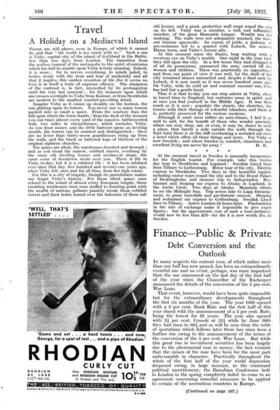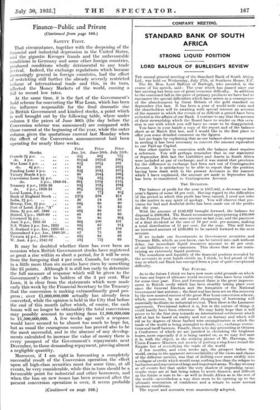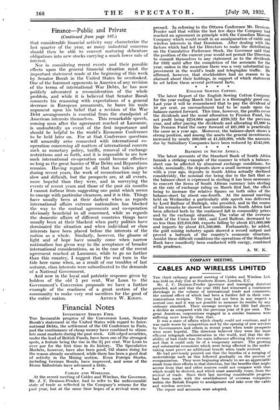Finance—Public & Private
Debt Conversion and the Outlook
TN many respects the current year, of which rather more than one half has now passed, has been an extraordinarily eventful one and no event, perhaps, was more important than the one announced on the last day of the first half of the year when the Chancellor of the Exchequer announced the details of the conversion of the 5 per cent. War Loan.
That event, however, would have been quite impossible but for the extraordinary developments throughout the first six months of the year. The year 1932 opened with a 6 per cent. Bank Rate and the first half of this year closed with the announcement of a 2 per cent. Rate, being the lowest for 35 years. The year also opened with 2f per cent. Consols at 551 while by June 30th they had risen to 66/, and as will be seen from the table of quotations which follows later there has since been a further rise owing to the announcement of the terms of the conversion of the 5 per cent. War Loan. But while this great rise in investment securities has been largely due to the phenomenal ease in money, the fact remains that the causes of the ease have been for the most part unfavourable in character. Practically throughout the whole of the first half of the year world depression deepened owing, in large measure, to the continued political unsettlement; the Danubian Conference held in London in the spring completely failed to come to an agreement concernmg remedial measures to be applied to certain of the necessitous countries in Europe.
(Continued on vale 107.)
Finance—Public and Private
(Continued from page 166.)
SAFETY FIRST.
That circumstance, together with the deepening of the financial and industrial depression in the United States, and the gigantic Kreuger frauds and the unfavourable conditions in Germany and some other foreign countries, produced conditions wholly detrimental to any trade revival. Indeed, the exchange regulations which became increasingly general in foreign countries, had the effect of restricting still further the already severely restricted volume of international trade and this, in its turn, affected the Money Markets of the world, causing a fall to record low rates.
At the same time, it is the fact of the Government's bold scheme for converting the War Loan, which has been the influence responsible for the final dramatic rise in British Government and kindred stocks, a point which is well brought out by the following table, where under column 2 the prices of June 30th (the day before the Conversion scheme was announced) are compared with those current at the beginning of the year, while the outer column gives the quotations current last Monday when the effect of the Conversion announcement had been operating for nearly three weeks.
Stocks. Price Jan. 1st. Price Price June 30th. July 25th.
Consols 21 p.c. .. • • 55
66 79 do. 4 p.c. .. ..
811xd 102xd 1061
War Loan 5 p.c. .. • •
951 101/ 102 do. 41 p.c... .. .. 93 102 1021 Funding Loan 4 p.c. .. 83} 1041 1071
Victory Bonds 4 p.c. .. . .
90 104/ 1061.
Conversion Loan 31 p.c. .. 73} 93} 100/ do. 5 p.c., 1944.64 . 99 110 115 Treasury 4 p.c., 1934-36 ..
931 1 1031 / 104}
do. 5 p.c., 1933-35 .. 981 1021 102 Local Loans, 3 p.c. .. 60 771 851 Bank of England Stock .. .. 2371 289 314 India, 21 p.c. .. .. 36 54 58 Metrop. Con. 21 p.c. .. .. 681 86 90 Port of Lend. 3 p.c. "A" .. 56 73 83 Birm. 31 p.c. aft. 1946 .. .. 691 86 97 Bristol, 3 p.c., 1920-60 .. 66 83 86 Liverpool 3/ p.c. .. .. 70 86 961
89/ 100 101 Aust. 6 p.c., 1931-41 . .. N.S. Wales 3 p.c. Ins., 1935 .. 69/ 85 911 N. Zealand 5 p.c. Ins., 1935-45 .. 86/ 97 104 Queensland 4 p.c. Ins., 1940-50.. 62 75 89 Victoria 41 p.c., 1940-60.. .. 691 83 98 W. Aust. 4 p.c., 1942-62 .. 581 73} 89
It may be doubted whether there has ever been an occasion when British Government stocks have registered NO great a rise within so short a period, for it will be seen from the foregoing that 4 per cent. Consols, for example, in a little more than six months have risen by something like 25 points. Although it is still too early to determine the full measure of response which will be given to the Government's offer to holders of the 5 per cent. War Loan, it is clear from the statements which were made early this week by the Financial Secretary to the Treasury that the conversion is making extraordinarily good pro- gress ; over £1,000,000,000 actually has already been converted, while the opinion is held in the City that before the end of this month (after which, of course, the cash bonus will no longer be obtainable) the total conversions may possibly amount to anything from £1,300,000,000 to £1,500,000,000. A few weeks ago such a response would have seemed to be almost too much to hope for, but as usual the courageous course has proved also to be the most successful, and in the absence of any develop- ments calculated to increase the value of money there is every prospect of the Government's repayments next December, to those demanding repayment, proving almost a negligible quantity.
Moreover, if I am right in forecasting a completely successful result of the Conversion operation the effect upon all high-class securities must for some time, at all events, be very considerable, while this in turn should be a favourable point for industrial and other borrowers, and when the ban on new issues has been removed after the present conversion operation is over, it seems probable (Continued on page 168.)
Finance—Public and Private
(Continued from page 167.) that considerable financial activity may characterize the last quarter of the year, as many industrial concerns should then be able to convert maturing debenture obligations into new stocks carrying a much lower rate of interest.
Nor in considering recent events and their possible effects upon the general financial situation must the important statement made at the beginning of this week by Senator Borah in the United States be overlooked. One of the foremost opponents in America of any revision of the terms of international War Debts, he has now publicly advocated a reconsideration of the whole problem, and while it is believed that Senator Borah connects his reasoning with expectations of a general decrease in European armaments, he bases his main argument upon his belief that a revision of the War Debt arrangements is essential from the standpoint of American interests themselves. This remarkable speech, coming soon after the agreement reached at Lausanne, is undoubtedly an event of the first importance and should be helpful to the world's Economic Conference to be held later on. For at that Conference questions will assuredly arise connected with international co- operation concerning all matters of international concern such as monetary policy, tariffs, removal of exchange restrictions and so forth, and it is impossible to see how such international co-operation could become effective so long as the great barrier of War Debts and Reparations remains. Having regard to all that has taken place during recent years, the work of reconstruction may be slow and difficult, but the prospects are, at all events, more hopeful than they were, and in surveying the events of recent years and those of the past six months I cannot forbear from suggesting one point which seems to emerge with particular clearness, and it is this. Things have usually been at their darkest when as regards international affairs extreme nationalism has blocked the way to the mutual agreements and co-operation obviously beneficial to all concerned, while as regards the domestic affairs of different countries things have usually been at their blackest when party politics have dominated the situation and when individual or class interests have been placed before the interests of the nation as a whole. Similarly, however, the gleams of light and of hope have usually come when narrow nationalism has given way to the acceptance of broader international considerations, as in the case of the recent agreement reached at Lausanne, while to go no farther than this country, I suggest that the real turn in the tide here came when, as a result of our troubles of last autumn, class interests were subordinated to the demands of a National Government.
And now in the loyal and patriotic response given by holders of the old 5 per cent. War Loan to the Government's Conversion proposals we have a further example of the readiness of a great section of the community to make very real sacrifices for the good of the entire nation. ARTHUR W. KIDDY.
































 Previous page
Previous page